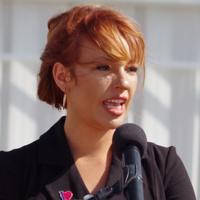City leaders got their first look Thursday at the completed pilot plant that Westwin Elements built in southwest Lawton to test the refining of cobalt and nickel.
The ribbon cutting for what Westwin is calling their demonstration plant comes a year after the company and city leaders broke ground on the 40-acre site along Southwest Bishop Road, about 1 mile south of the Goodyear plant, and less than five months after construction began in earnest, said Westwin CEO KaLeigh Long. The ceremony was witnessed by members of Westwin’s board of directors, as well as employees and investors who have already contributed to the cost of the demonstration plant and are expected to help fund what is estimated as a $732.5 million commercial refinery.
It also came amidst heightened security for those attending the ceremony and walking through the plant.
The 5,000-square-foot building features a feed handling area, process area, and a product holding, testing and lab, essentially functioning as a scaled-down version of the commercial refinery. The data to come out of the demonstration plant is expected to provide the data necessary for the bankable feasibility study, a document that local financial experts said banks and investors will want before giving any money to the project. That bankable feasibility study is expected to be completed by year’s end, Westwin board member Dennis Muillenberg said at luncheon and reception held after the ribbon cutting.
U.S. demand for the material that the plant will provide is growing, Long said, adding while the U.S. needed 270,000 tons of the material in 2022, that number is expected to grow to 1.16 million tons by 2030. Not only does the refined cobalt and nickel have commercial applications (electric batteries, most notably), it is important in the nation’s defense because of its use in items such as aircraft.
Long said even she was impressed by the speed at which the demonstration plant has come together.
“Two and a half years ago, Westwin was merely an idea. A good one, though,” she said, adding that eight months ago, the company received the authorizations it needed to begin construction and only five and one-half months ago, the first steel supports were erected on what she called America’s first nickel carbonyl refinery.
While excited by the demonstration plant, Long said Westwin is focused on the future and building its commercial refinery (while Lawton leaders expect that complex to be built in Lawton, Westwin has not made that announcement). Long said the company has raised $60.2 million and has conditional commitments for $15 million more. The company also is exploring its options for federal funding, potentially giving it another $200 million. Long said the company heard this week from the Department of Defense that it could submit an application for an $80 million grant.
Company officials also have locked down 50 percent of the necessary feed stock (the minerals to be refined) for the first five years of operation, and is close to completing the remaining 50 percent, Long said.
And earlier this week, one of the nation’s largest battery manufacturers started testing Westwin’s product, Long said, adding what that one company would need exceeds what Westwin’s plant could produce in a year.
That makes the commercial refinery crucial, Westwin and Lawton economic experts said. Westwin expects to break ground on its commercial expansion “in only seven months,” Long said. Muillenberg said the plant is expected to come on line in 2026.
Mayor Stan Booker is among those who expects Lawton to have the edge when a location is announced.
“Lawton and Westwin are a great team,” he said, highlighting a series of events between the company and local officials that provided the team effort that brought the project to life.
Booker said Comanche County makes sense for the plant, given its military and national security applications. Comanche County has the 10th largest concentration of veterans in the country, Booker said, adding the plant is a big win for Lawton, Lawton-Fort Sill, Oklahoma and the nation. And, Booker said many Westwin employees now working at the demonstration plant are local residents who are “ready to kick things off.”
Want to reach a local audience and grow your business?
Our website is the perfect platform to connect with engaged readers in your local area.
Whether you're looking for banner ads, sponsored content, or custom promotions, we can tailor a package to meet your needs.
Contact us today to learn more about advertising opportunities!
CONTACT US NOW



